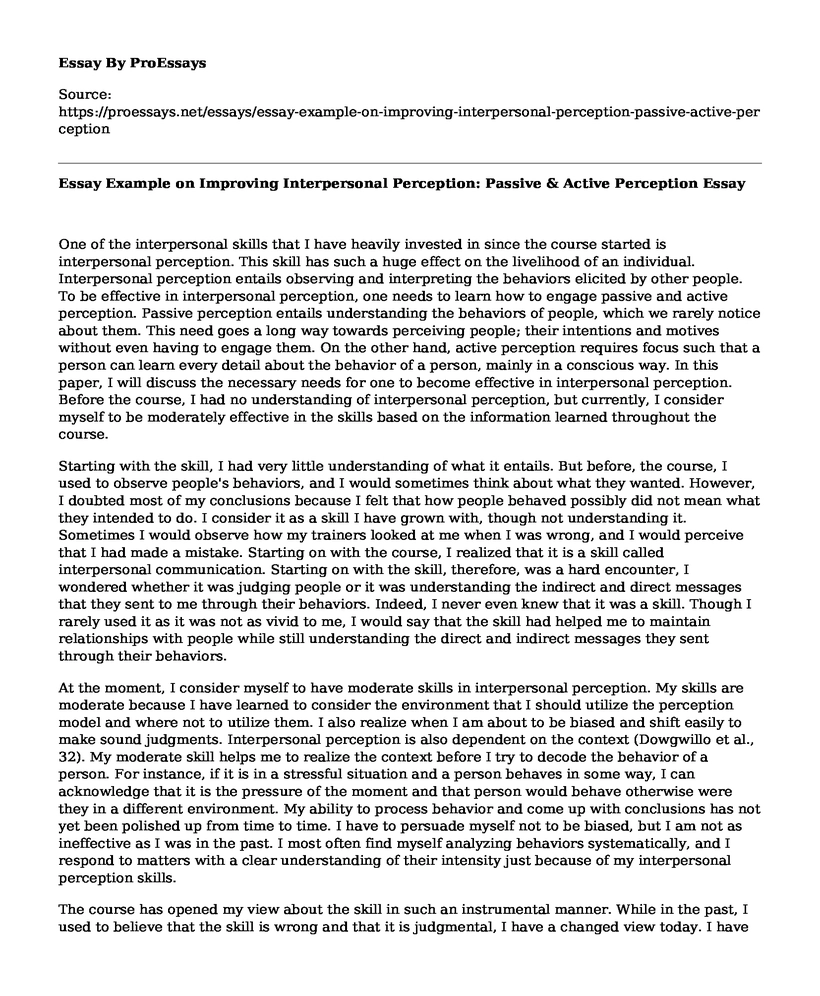One of the interpersonal skills that I have heavily invested in since the course started is interpersonal perception. This skill has such a huge effect on the livelihood of an individual. Interpersonal perception entails observing and interpreting the behaviors elicited by other people. To be effective in interpersonal perception, one needs to learn how to engage passive and active perception. Passive perception entails understanding the behaviors of people, which we rarely notice about them. This need goes a long way towards perceiving people; their intentions and motives without even having to engage them. On the other hand, active perception requires focus such that a person can learn every detail about the behavior of a person, mainly in a conscious way. In this paper, I will discuss the necessary needs for one to become effective in interpersonal perception. Before the course, I had no understanding of interpersonal perception, but currently, I consider myself to be moderately effective in the skills based on the information learned throughout the course.
Starting with the skill, I had very little understanding of what it entails. But before, the course, I used to observe people's behaviors, and I would sometimes think about what they wanted. However, I doubted most of my conclusions because I felt that how people behaved possibly did not mean what they intended to do. I consider it as a skill I have grown with, though not understanding it. Sometimes I would observe how my trainers looked at me when I was wrong, and I would perceive that I had made a mistake. Starting on with the course, I realized that it is a skill called interpersonal communication. Starting on with the skill, therefore, was a hard encounter, I wondered whether it was judging people or it was understanding the indirect and direct messages that they sent to me through their behaviors. Indeed, I never even knew that it was a skill. Though I rarely used it as it was not as vivid to me, I would say that the skill had helped me to maintain relationships with people while still understanding the direct and indirect messages they sent through their behaviors.
At the moment, I consider myself to have moderate skills in interpersonal perception. My skills are moderate because I have learned to consider the environment that I should utilize the perception model and where not to utilize them. I also realize when I am about to be biased and shift easily to make sound judgments. Interpersonal perception is also dependent on the context (Dowgwillo et al., 32). My moderate skill helps me to realize the context before I try to decode the behavior of a person. For instance, if it is in a stressful situation and a person behaves in some way, I can acknowledge that it is the pressure of the moment and that person would behave otherwise were they in a different environment. My ability to process behavior and come up with conclusions has not yet been polished up from time to time. I have to persuade myself not to be biased, but I am not as ineffective as I was in the past. I most often find myself analyzing behaviors systematically, and I respond to matters with a clear understanding of their intensity just because of my interpersonal perception skills.
The course has opened my view about the skill in such an instrumental manner. While in the past, I used to believe that the skill is wrong and that it is judgmental, I have a changed view today. I have learned that it is indeed a skill that is needed in everyday life. Interpersonal perception is needed to ensure that information is not only stored in mind, but it is also processed effectively. Throughout the course, I learned that interpersonal perception aids in organizing information quickly and handling it perfectly such that there is no bias in the finalization of results. The course taught me that for this skill to be effective, there is a need to close all channels of prejudice and set the brains in a way that they can recall information, use similar organization experiences and make conclusions that are fulfilling.
Interpersonal perception is one of the skills that are so effective for human survival. It makes people have the specific ability to understand the behaviors of others, interpret them, and even remember them. Improved perception tools are needed in not just personal encounters but even in industrial settings as well as in business. Cognitively, this skill cannot be well utilized. Its effectiveness depends on how well an individual is predisposed to them. For the future, I want to invest in more of the knowledge that I have learned in the course. I would also like to improve my interpretation of behaviors to ensure that I determine the cause of action. The skill will help me with my future assignments. It will help me to be an agent of change in decision-making as well as exploring people's behavior and determining the next course of action even in organizational settings.
Works Cited
Dowgwillo, Emily A., et al. "Two methods for operationalizing the interpersonal situation to investigate personality pathology and interpersonal perception in daily life." Personality disorders: What we know and future directions for research (2019): 31-106.
Cite this page
Essay Example on Improving Interpersonal Perception: Passive & Active Perception. (2023, May 08). Retrieved from https://proessays.net/essays/essay-example-on-improving-interpersonal-perception-passive-active-perception
If you are the original author of this essay and no longer wish to have it published on the ProEssays website, please click below to request its removal:
- Essay Example on Social Issue - The Effect of Divorce for Young Generation
- The Impact of Social Media on the Society Essay
- The Basis of Divorce in England and Wales - Essay Sample
- Critical Essay: Eva Derzic's Perspective on Communication
- Modernity & Colonialism: Examining Contemporary Societies - Essay Sample
- Essay Sample on Friends: Boundaries and Perspectives Matter
- Essay Sample on Communication: Past, Present and Future







